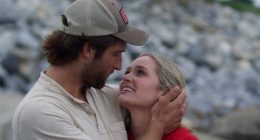
Previously best known as singer-songwriter and music producer The Bullitts, Jeymes Samuel burst into the film world this year with dramatic, gun-slinging fashion thanks to his feature debut, Netflix’s The Harder They Fall.
But Samuel didn’t just direct and co-write the all-star, all-black Western, with an A-list cast — which includes the likes of Regina King, Idris Elba, Jonathan Majors, LaKeith Stanfield, Delroy Lindo and Zazie Beetz — that has already received the Gotham ensemble tribute award. The Brit also devoted his musical talents to the genre-spanning score, which he says took in the whole African diaspora, “from Cape Verde to Jamaica, from Mali to Brooklyn, from London to South Africa,” reuniting with his long-term collaborator Jay-Z (who also exec produced the film) in the process.
Speaking to The Hollywood Reporter as part of Netflix’s Playlist series, Samuel discusses how the music was part of the development process from the very beginning (and why it should always be this way in films), how his first inspiration for the score has been with him since he was a child and what to expect when he gets a text from Jay-Z while the rapper is on the treadmill.
From what I understand, the score for The Harder They Fall was one of the very first things that you had planned and written, long before you set foot behind a camera. Is that correct?
Absolutely. I was writing the score as I was writing the script. Words have melodies. So when I’m writing the dialogue, talking things out, I’m hearing melodies. For me, the music, the songs, or the score or the film itself, they’re all the same thing for me. It’s all about storytelling. With a song you’re telling the story. There’s three acts in a script and there’s three acts in a song. The whole ethos behind the score was to tell a story sonically, not to complement what was going on in the script, but to converse with it, to help tell that story. Also the score would find the script and the soundtrack, which doesn’t happen in films these days. Soundtracks have become glorified compilation albums.
Was there a starting off point? Did you have one element of the score that was nailed really early on and knew instantly that it was going to be used?
Yeah, there was one. It was this song, “Here I Come” by Barrington Levy, which, since I first heard it as a child, I’ve always thought of horses galloping. So I knew I was going to rebuild that track, and I used it when I wrote the scene where they gallop towards the train. I actually wrote to Barrington, as he’s still alive, and got him to sing his signature melody from “Here I Come” over the score. So that was my jumping off point, because the train scene was the first scene that I wrote.
There’s a lot of different genres running throughout the music, much of which isn’t what you’d automatically expect to hear in a Western. What sort of inspiration did you have and did you lean on any of the Westerns of old?
I lent on Westerns with regards to the rules and rules of composing, so giving each character their own motif. But I actually started with folk music. There’s a song called “Three and Thirty Years,” which appears three times — each time Jonathan Majors’ and Idris Elba’s characters meet each other. By the third time it’s sung, it’s an opera, so I go from folk to opera with the same song in one movie. So for me, it’s all the same thing. I’ve heard people say that this uses modern music for a Western, but Westerns have always done that. Billy the Kid wasn’t listening to Ennio Morricone! When Dean Martin and Ricky Nelson sing “My Rifle, My Pony and Me” to John Wayne in Rio Bravo, that wasn’t cowboy music from the day. So it’s all new, really.
In most films, the composer works with the director and tries to meet their vision for the film. With The Harder They Fall, you’re obviously both. So which side led the decision-making process?
As a composer, I worked with the most understanding director! Everything I did was right! But I suppose I always say that I see music and hear cinema. So as I’m writing a script, I’m almost doing it as a musician, and as I’m writing a score, I’m almost doing it as a filmmaker. So it was almost like one continuous thought. But I always believe that composers come to a project too late. I think a director should be working with a composer the minute they get their hand on the script. And if the director is writing a script, he should be working with the composer then.
With music being such a key component of The Harder They Fall, did you actually play music on set while you were shooting?
Absolutely! I remember when the Rufus Buck gang round into Redwood, I played as they were riding in. I remember when the stunt people did the walkthrough first, Idris looked at me when it came over the speakers. I don’t know if he’s had that before on set! So I said to him, “You think I came here to play games?” So yeah, I was playing music as we were filming, I was playing music in rehearsals. In rehearsals, I never actually said action, I just had live musicians and it was like, when you hear the music, then go.
The title track, Guns Go Bang, featuring both Kid Cudi and Jay-Z, is potentially up for Oscar contention. How did that one come together?
I had the music in my head for that for like 100 years. And for the words, it’s the story of Nat Love (Majors’ character). So I was at home, building the track. But Kid Cudi and I go back to I think 2008-2009, and I wanted him to come and cook and finish off the words and Jay-Z reconnected us. Then it became much more fleshed out. Cudi and I wrote the words. I did my stuff and he put his sauce on it. And then Jay-Z wrote 12 bars, and in those 12 bars, he literally tells the entire story of the movie. So we actually give away the entire story of The Harder They Fall in Jay-Z’s verse in the opening credits, but you just don’t know!
But he doesn’t give away the twist at the end?
No, he doesn’t give that away! But when you watch it and listen again to Jay’s lyrics, he really does give you all the Usual Suspects-style clues.
I have to ask a little more about Jay-Z as I think it’s probably illegal not too. Aside from Guns Go Bang, did he collaborate elsewhere on the music?
Me and Jay are kind of joined at the hip, creatively. So he’s involved in literally every aspect. When I’m writing anything, I’ll send it to him. We’ll keep going back and forth on everything, regardless of whether he was attached to the movie or not. It just so happens that he was attached. And when Jay writes a verse, he’ll call me and he’s on the treadmill, and he’ll say ‘you by yourself?’ And when he says ‘you by yourself’ you know that the best verse in the history of verses is coming.
Source: HollyWood








